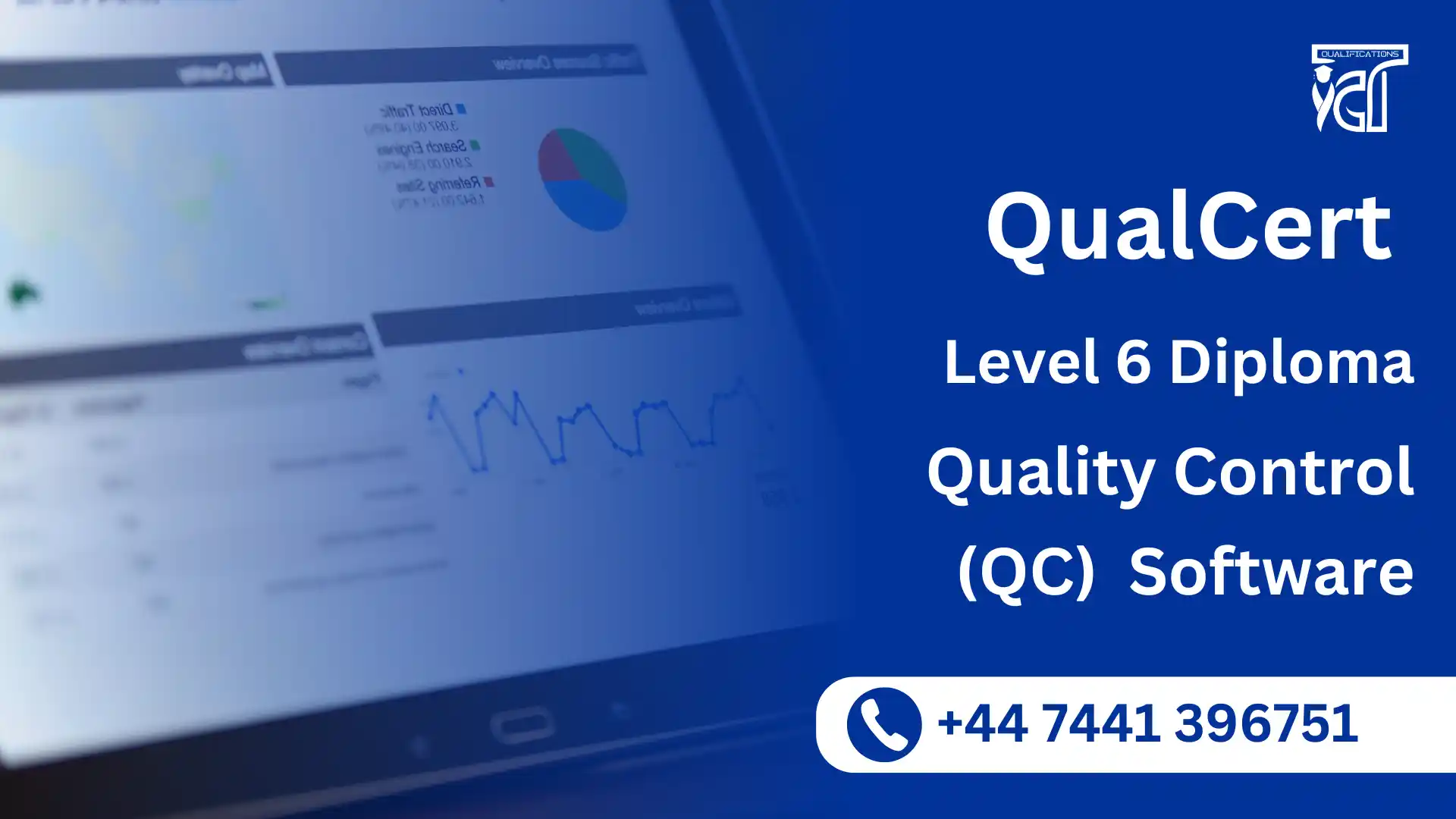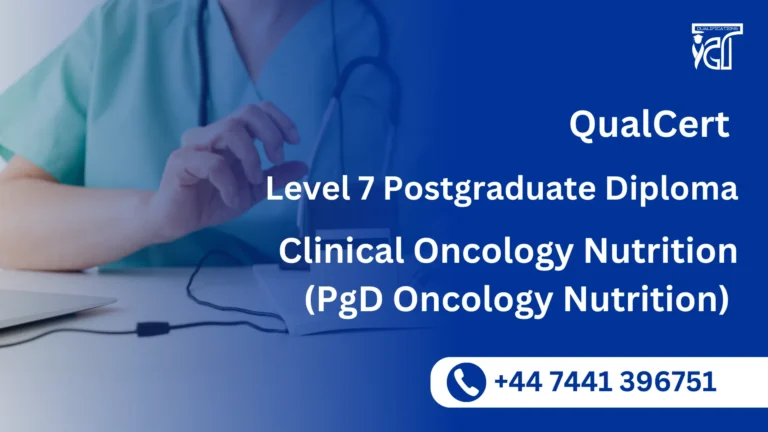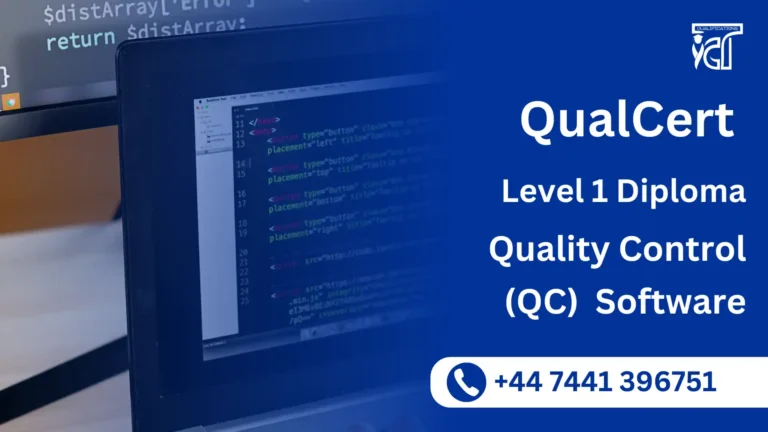The QualCert Level 6 Diploma in Quality Control (QC) Software is a comprehensive qualification designed to equip mid- to senior-level software professionals with advanced knowledge and practical skills in software quality management. This diploma addresses the growing need for structured quality control practices in modern software development environments, combining theoretical frameworks with industry-relevant tools and techniques.
With a strong emphasis on risk management, compliance, automation, and emerging technologies, the course prepares learners to design, implement, and lead quality assurance processes across diverse software projects. Participants will explore advanced testing methodologies, software audit practices, and global standards such as ISO/IEC 25010, while developing the leadership capabilities needed to manage QA teams and drive continuous improvement.
Ideal for professionals working in software engineering, testing, or IT project management, this diploma enables learners to navigate the challenges of quality control in the digital age and contribute to the delivery of high-performance, reliable, and compliant software systems.
QualCert Level 6 Diploma in Quality Control (QC) Software
The QualCert Level 6 Diploma in Quality Control (QC) Software comprises several study units designed to provide learners with a comprehensive understanding of QC principles and practices in the software sector. Below is the qualification structure, including the Total Qualification Time (TQT) 1200, Guided Learning Hours (GLH) 600, and 120 Credits associated with the program.
| Unit Ref# | Unit Title | Credit | GLH | TQT |
| QC11013 – 1 | Enterprise-Wide QC Systems | 20 | 100 | 200 |
| QC11013 – 2 | Predictive and Prescriptive QC Analytics | 20 | 100 | 200 |
| QC11013 – 3 | Regulatory Frameworks and Global QC Policies | 20 | 100 | 200 |
| QC11013 – 4 | QC Software Architecture and Security | 20 | 100 | 200 |
| QC11013 – 5 | Sustainability and Ethical QC Practices | 20 | 100 | 200 |
| QC11013 – 6 | Emerging Technologies in QC Software | 20 | 100 | 200 |
GLH (Guided Learning Hours) and TQT (Total Qualification Time) are terms commonly used in vocational qualifications to help define the amount of time a learner is expected to spend on their studies.
1. GLH (Guided Learning Hours)
GLH refers to the number of hours a learner spends being directly taught, supervised, or supported during their course. This includes the time spent in activities such as:
- Classroom instruction
- Practical workshops
- One-on-one tutoring or mentoring sessions
- Online learning sessions with tutor support
In other words, GLH represents the time that learners are actively engaged with their instructors or learning activities.
2. TQT (Total Qualification Time)
TQT represents the total amount of time a learner is expected to invest in completing a qualification, including:
- GLH (Guided Learning Hours): Time spent on direct learning, as explained above.
- Self-Directed Learning: This includes time spent on independent study, research, assignment completion, preparation for exams, and any other work the learner does outside of direct teaching hours.
TQT is a broader measure that includes all the time required to achieve the qualification. It helps learners and employers understand the overall commitment required for the qualification.
Key Differences Between GLH and TQT:
- GLH focuses on direct learning with guidance or supervision.
- TQT includes GLH as well as independent study time and other learning-related activities.
Example:
If a qualification has a TQT of 600 hours and a GLH of 250 hours, it means the learner should spend 250 hours in direct learning (classroom, online, or tutor-led sessions) and 350 hours on independent study or research.
Enterprise-Wide QC Systems
- Design and implement quality control systems that align with enterprise-wide objectives.
- Integrate QC processes across multiple departments and software development teams.
- Utilize automation tools to enhance consistency and efficiency in software QC.
- Develop centralized reporting frameworks for quality monitoring and decision-making.
- Assess the impact of enterprise-wide QC strategies on overall business performance.
Predictive and Prescriptive QC Analytics
- Apply predictive analytics to anticipate software defects and performance issues.
- Utilize prescriptive analytics to recommend data-driven quality control actions.
- Implement machine learning models to improve software testing accuracy and efficiency.
- Interpret QC data insights to drive proactive software improvement initiatives.
- Optimize defect prevention strategies using statistical and AI-driven approaches.
Regulatory Frameworks and Global QC Policies
- Analyze international regulatory frameworks governing software quality assurance.
- Ensure compliance with industry-specific QC regulations and legal requirements.
- Develop policies to maintain adherence to global software quality standards.
- Assess the impact of evolving regulations on software testing and development practices.
- Implement audit and documentation strategies to support regulatory compliance.
QC Software Architecture and Security
- Integrate quality control principles into software architecture design.
- Implement secure coding practices to enhance software reliability and security.
- Assess vulnerabilities and implement security testing methodologies within QC frameworks.
- Develop strategies for secure software deployment and maintenance.
- Align QC processes with cybersecurity best practices and risk management protocols.
Sustainability and Ethical QC Practices
- Implement sustainable quality control methodologies in software development.
- Evaluate the ethical implications of AI, automation, and data privacy in QC.
- Develop frameworks for responsible software testing and defect management.
- Promote eco-friendly and socially responsible software quality assurance practices.
- Address ethical challenges related to transparency, accountability, and bias in QC.
Emerging Technologies in QC Software
- Assess the impact of new technologies such as blockchain, IoT, and cloud computing on QC.
- Integrate automation and intelligent systems into software quality assurance processes.
- Explore the role of augmented reality (AR) and virtual reality (VR) in software testing.
- Adapt quality control methodologies to evolving technological advancements.
- Implement continuous learning strategies to stay updated with emerging QC trends.
✅ Course Benefits: QualCert Level 6 Diploma in QC Software
1. Master Advanced Quality Control Techniques
This course equips learners with cutting-edge skills in predictive analytics, enterprise-wide QC implementation, and AI-powered testing tools—preparing you to lead in modern, data-driven software environments.
2. Boost Employability in Global Tech Markets
Graduates of this diploma gain a strong competitive edge in both local and international software industries by understanding global QC standards, compliance frameworks, and industry best practices.
3. Enhance Leadership and Strategic Thinking
Develop the ability to design and manage quality control systems that align with business goals, manage multidisciplinary QA teams, and drive performance improvements across large-scale projects.
4. Stay Ahead with Emerging Technologies
Stay future-ready by exploring the impact of new technologies such as blockchain, cloud computing, IoT, and AR/VR on software QC—making you adaptable to ongoing technological change.
5. Improve Software Security and Compliance
Gain in-depth knowledge of secure software architecture and how to embed QC protocols that comply with international cybersecurity and data privacy standards.
6. Contribute to Ethical and Sustainable Software Development
Learn how to implement sustainable and ethical quality control practices by addressing concerns like automation bias, data transparency, and eco-friendly development protocols.
7. Flexible Career Pathways
This diploma opens doors to senior roles such as QA Lead, QC Analyst, Software Testing Manager, Compliance Auditor, and Software Quality Strategist, with opportunities across industries including fintech, healthcare, logistics, and enterprise IT.
Ideal Learner for QualCert Level 6 Diploma in Quality Control (QC) Software
Experienced Software Professionals
This course is ideal for mid- to senior-level software developers, QA engineers, and quality assurance specialists seeking to enhance their expertise in enterprise-level quality control systems and advanced analytics.
Tech-Savvy Quality Control Practitioners
Learners with a background in software testing, quality auditing, or software process management who want to align their skills with global standards and adopt AI-driven QC practices will benefit greatly.
Team Leads and Project Managers
Project coordinators, team leaders, and software development managers looking to implement enterprise-wide QC strategies, manage cross-functional QA teams, and improve software lifecycle efficiency will find this course highly valuable.
Compliance and Risk Management Professionals
Those involved in IT compliance, regulatory documentation, or software governance can enhance their capabilities in navigating legal standards, cybersecurity protocols, and ethical QC frameworks.
Lifelong Learners and Innovators
This qualification also suits proactive learners eager to stay updated on emerging trends like blockchain, cloud-native testing, machine learning in QC, and ethical testing standards.
Entry Requirements
Entry Requirements: QualCert Level 6 Diploma in Quality Control (QC) Software
To ensure candidates are prepared for the academic and practical demands of the program, the following entry requirements apply:
Education
- A Level 5 Diploma in Software Engineering, Quality Control, Information Technology, or a related discipline.
- Alternatively, a Bachelor’s Degree in Computer Science, Software Engineering, or equivalent is also acceptable.
Work Experience
- Minimum 2 years of relevant professional experience in software development, software testing, quality assurance, or IT project management is recommended.
English Language Proficiency
- For non-native English speakers, a minimum IELTS score of 5.5 or an equivalent qualification in English is recommended.
- Alternatively, candidates may be required to demonstrate proficiency through an internal language assessment.
Technical Competency
- Familiarity with software development life cycles (SDLC), testing tools, and basic programming logic.
- Comfortable with using analytical tools, reporting dashboards, or QC-related software is a plus.
Register Now
Qualification Process
Qualification Process for the QualCert Level 6 Diploma in Quality Control (QC) Software
- Self-Assessment:
Begin by evaluating your eligibility to ensure you meet the qualification requirements, including work experience, knowledge, and language proficiency. - Registration:
Complete your registration by submitting the required documents, including a scanned copy of a valid ID, and paying the registration fee. - Induction:
An assessor will conduct an induction to confirm your eligibility for the course and explain the evidence requirements. If you do not meet the criteria, your registration will be canceled, and the fee will be refunded. - Assignmnets & Evidence Submission:
Provide all assignmnets and the necessary evidence based on the assessment criteria outlined in the course. If you are unsure of the required evidence, consult with the assessor for guidance on the type and nature of evidence needed. - Feedback and Revision:
The assessor will review your submitted evidence and provide feedback. Evidence that meets the criteria will be marked as “Criteria Met,” while any gaps will be identified. You will be asked to revise and resubmit if needed. - Competence Evidence:
Submit final evidence demonstrating that all learning outcomes have been met. This evidence will be marked as “Criteria Met” by the assessor once it is satisfactory. - Internal Quality Assurance (IQA):
The Internal Quality Assurance Verifier (IQA) will review your evidence to ensure consistency, quality, and compliance with standards. - External Verification:
The IQA will submit your portfolio to QualCert External Quality Assurance Verifiers (EQA) for final confirmation. The EQA may contact you directly to verify the authenticity of your evidence. - Certification:
Upon successful completion of all checks, QualCert will issue your official certificate, confirming that you have attained the QualCert Level QualCert Level 6 Diploma in Quality Control (QC) Software.







